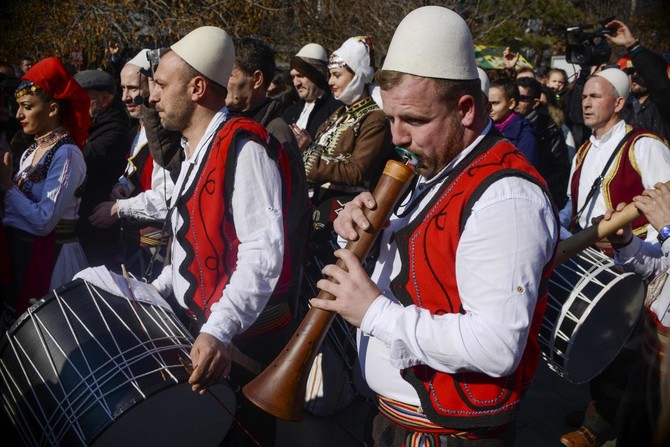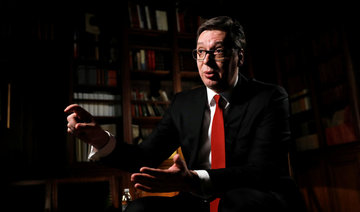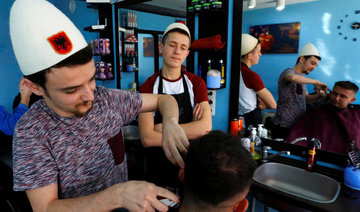PRISTINA: Kosovo, which celebrates 10 years of independence on Saturday, has a flag that few people care about, four international telephone codes and a judoka hero.
Here are five things to know about the youngest European country.
1. Kosovo’s flag bears the shape of its territory and six yellow stars, for its six main ethnic groups, on a blue background. It is mockingly called a towel by members of Kosovo’s ethnic Albanian majority, who believe it was adopted largely to please Western patrons. The flag flown all over Kosovo is that of neighboring Albania — a black double-headed eagle on a red background. The American stars and stripes are also prevalent, owing to Washington’s strong support in Kosovo’s struggle for independence from Serbia. In the areas that are home to Kosovo’s ethnic Serb minority, the “towel” is rarely seen and instead, the Serbian flag dominates.
2. Owing to Serbia’s opposition to independence, three other countries’ dialling codes are in use in Kosovo: Serbia’s +381 for landlines plus Monaco’s +377 and Slovenia’s +386 for mobile phones. Kosovo was allocated +383 as its own code after striking a deal with Belgrade. This is already being used on the popular messaging app Viber and is due to be fully operational later this year.
3. Kosovo beat its big brother Albania to an Olympic medal during the country’s first appearance at the Games in Rio in 2016, when national heroine Majlinda Kelmendi took gold in judo. Kosovo uses sport as a diplomatic tool and gained admission to the International Olympic Committee in 2014 to the great displeasure of Serbia. It proudly celebrated skier Albin Tahiri, Kosovo’s lone athlete in last week’s opening parade in Pyeongchang and its first sportsman in a Winter Olympics.
4. Kosovo is home to around 1.8 million people but another 700,000 Kosovo Albanians are estimated to live abroad, mostly in Germany and Switzerland. The diaspora, which has its own ministry, sent some 620 million euros ($760 million) to Kosovo in the first 10 months of 2017, making it a major contributor to the functioning of the country, alongside international aid.
5. Some 95 percent of Kosovo Albanians are Muslims, but one of the Balkan region’s largest Roman Catholic cathedrals sits in the center of Pristina. Dedicated to Saint Mother Teresa, of ethnic Albanian heritage, the church is a symbol of gratitude to the West for supporting independence.
Five things to know about Kosovo as it celebrates 10 years of independence
Five things to know about Kosovo as it celebrates 10 years of independence

Two high-speed trains derail in Spain, police sources say 21 people killed

- The accident happened near Adamuz, in Cordoba province. So far, 21 people have been confirmed dead by police
MADRID: A high-speed train derailed and smashed into another oncoming train in southern Spain on Sunday, pushing the second train off the tracks in a collision that police sources confirmed to Reuters had killed at least 21 people.
The accident happened near Adamuz, in Cordoba province. So far, 21 people have been confirmed dead by police, with state broadcaster Television Espanola adding that 100 people had been injured, 25 seriously. The driver of one of the trains, which was traveling from Madrid to Huelva, was among those who died, the TV station added.
“The Iryo 6189 Malaga — (to Madrid) train has derailed from the track at Adamuz, crashing onto the adjacent track. The (Madrid) to Huelva train which was traveling on the adjacent track has also derailed,” said Adif, which runs the rail network, in a social media post.
Adif said the accident happened at 6:40 p.m. (1740 GMT), about 10 minutes after the Iryo train left Cordoba heading toward Madrid.
Iryo is a private rail operator, majority-owned by Italian state-controlled railway group Ferrovie dello Stato. The train involved was a Freccia 1000 train which was traveling between Malaga and Madrid, a spokesperson for Ferrovie dello Stato said.
The company said in a statement that it deeply regretted what had happened and had activated all emergency protocols to work closely with the relevant authorities to manage the situation.
The second train was operated by Renfe, which also did not respond to a request for comment.
Adif has suspended all rail services between Madrid and Andalusia.
HORRIFIC SCENE
The Iryo train had more than 300 passengers on board, while the Renfe train had around 100.
Paco Carmona, Cordoba fire chief, told TVE the first train heading to Madrid from Malaga had been evacuated.
The other train’s carriages were badly damaged, he said, with twisted metal and seats. “There are still people trapped. We don’t know how many people have died and the operation is concentrating on getting people out of areas which are very narrow,” he said. “We have to remove the bodies to reach anyone who is still alive. It is proving to be a complicated task.”
Transport Minister Oscar Puente said he was following events from rail operator Adif’s headquarters in Madrid.
“The latest information is very serious,” he posted on X. “The impact was terrible, causing the first two carriages of the Renfe train to be thrown off the track. The number of victims cannot be confirmed at this time. The most important thing now is to help the victims.”
The mayor of Adamuz, Rafael Moreno, told El Pais newspaper that he had been among the first to arrive at the scene of the accident alongside the local police and saw what he believed to be a badly lacerated body several meters from the accident site.
“The scene is horrific,” he said. “I don’t think they were on the same track, but it’s not clear. Now the mayors and residents of the area are focused on helping the passengers.”
CALLS FOR MEDICS
Images on local television showed a reception center set up for passengers in the town of Adamuz, population 5,000, with locals coming and going with food and blankets amid nighttime temperatures of around 42 degrees Fahrenheit (6 degrees Celsius).
A woman named Carmen posted on X that she had been on board the Iryo train to Madrid. “Ten minutes after departing (from Cordoba) the train started to shake a lot, and it derailed from coach 6 behind us. The lights went out.”
Footage posted by another Iryo train passenger, also on X, showed an Iryo staffer in a fluorescent jacket instructing passengers to remain in their seats in the darkened carriages, and those with first aid training to keep watch over fellow passengers. He also urged people to maintain mobile phone batteries to be able to use their torches when they disembarked.
Salvador Jimenez, a journalist for RTVE who was on board the Iryo train, shared images showing the nose of the rear carriage of the train lying on its side, with evacuated passengers sitting on the side of the carriage facing upwards.
Jimenez told TVE by phone from beside the stricken trains that passengers had used emergency hammers to smash the windows and climb out, and they had seen two people taken out of the overturned carriages on stretchers.
“There’s a certain uncertainty about when we’ll get to Madrid, where we’ll spend the night, we’ve had no message from the train company yet,” he said. “It’s very cold but here we are.”













